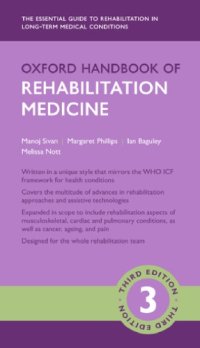
Ebook: Oxford Handbook of Rehabilitation Medicine
- Tags: Allied Health Services, Occupational Therapy, Physical Therapy, Alternative & Complementary Medicine, Physical Medicine & Rehabilitation, Audiology & Speech Pathology
- Series: Oxford Medical Handbooks
- Year: 2019
- Publisher: Oxford University Press
- Edition: 3rd Edition
- Language: English
- pdf
Written in the succinct Oxford Handbook style, featuring bulleted lists and concise, easy-to-navigate information for quick reference at your fingertips
Fully updated with the latest evidence-based research to give a current overview of the field
Filled with illustrations and flowcharts to aid understanding and add clarity
New to this Edition:
Expanded scope, with new chapters on rehabilitation aspects of musculoskeletal conditions, pain, cancer, old age, cardiac conditions, and pulmonary conditions
New applications of assistive technology in the field of Rehabilitation Medicine have been included since the previous edition
Chapters are laid out to match the WHO ICF framework for health conditions
New artwork and flowchart algorithms have been added, to aid in understanding complex topics
The Oxford Handbook of Rehabilitation Medicine is designed to provide concise information on rehabilitation aspects of long-term medical conditions affecting adults. The book has two sections, one on clinical symptom-specific approaches and another on condition-specific approaches. The clinical approach section outlines the management of common symptoms encountered in rehabilitation settings. The section on specific conditions provides information that will enable the reader to put the symptoms in context with the condition and provide direct management in a comprehensive and holistic manner.
As the practice in rehabilitation goes beyond dealing with condition specific symptoms and is more focused on problem solving, the handbook provides a solid grounding in managing common practical problems in functions such as mobility, cognition, sex, relationships and work productivity. The conditions covered include neurological, musculoskeletal, neuromuscular, cardiac, pulmonary, cancer, vascular, trauma and burns. The latest advances from the field of orthotics, prosthesis, wheelchairs, technical aids and rehabilitation technology are included. The content and layout within each chapter and handbook as a whole attempt to capture all the aspects of WHO ICF biopsychosocial model for health conditions.
This Handbook, although aimed at medical doctors in the specialist area of Rehabilitation Medicine (also known as Physical and Rehabilitation Medicine in some countries), will prove useful to other members of the multidisciplinary rehabilitation team such as physiotherapists, occupational therapists, nurses, psychologists, speech and language therapists, dieticians, support workers and any other allied healthcare professionals working in rehabilitation of chronic conditions. The Handbook will also appeal to doctors in the related specialties like Neurology, Orthopaedics and Trauma, Palliative Medicine, Geriatrics, Pain Medicine and Sports and Exercise Medicine.
Fully updated with the latest evidence-based research to give a current overview of the field
Filled with illustrations and flowcharts to aid understanding and add clarity
New to this Edition:
Expanded scope, with new chapters on rehabilitation aspects of musculoskeletal conditions, pain, cancer, old age, cardiac conditions, and pulmonary conditions
New applications of assistive technology in the field of Rehabilitation Medicine have been included since the previous edition
Chapters are laid out to match the WHO ICF framework for health conditions
New artwork and flowchart algorithms have been added, to aid in understanding complex topics
The Oxford Handbook of Rehabilitation Medicine is designed to provide concise information on rehabilitation aspects of long-term medical conditions affecting adults. The book has two sections, one on clinical symptom-specific approaches and another on condition-specific approaches. The clinical approach section outlines the management of common symptoms encountered in rehabilitation settings. The section on specific conditions provides information that will enable the reader to put the symptoms in context with the condition and provide direct management in a comprehensive and holistic manner.
As the practice in rehabilitation goes beyond dealing with condition specific symptoms and is more focused on problem solving, the handbook provides a solid grounding in managing common practical problems in functions such as mobility, cognition, sex, relationships and work productivity. The conditions covered include neurological, musculoskeletal, neuromuscular, cardiac, pulmonary, cancer, vascular, trauma and burns. The latest advances from the field of orthotics, prosthesis, wheelchairs, technical aids and rehabilitation technology are included. The content and layout within each chapter and handbook as a whole attempt to capture all the aspects of WHO ICF biopsychosocial model for health conditions.
This Handbook, although aimed at medical doctors in the specialist area of Rehabilitation Medicine (also known as Physical and Rehabilitation Medicine in some countries), will prove useful to other members of the multidisciplinary rehabilitation team such as physiotherapists, occupational therapists, nurses, psychologists, speech and language therapists, dieticians, support workers and any other allied healthcare professionals working in rehabilitation of chronic conditions. The Handbook will also appeal to doctors in the related specialties like Neurology, Orthopaedics and Trauma, Palliative Medicine, Geriatrics, Pain Medicine and Sports and Exercise Medicine.
Download the book Oxford Handbook of Rehabilitation Medicine for free or read online
Continue reading on any device:

Last viewed books
Related books
{related-news}
Comments (0)